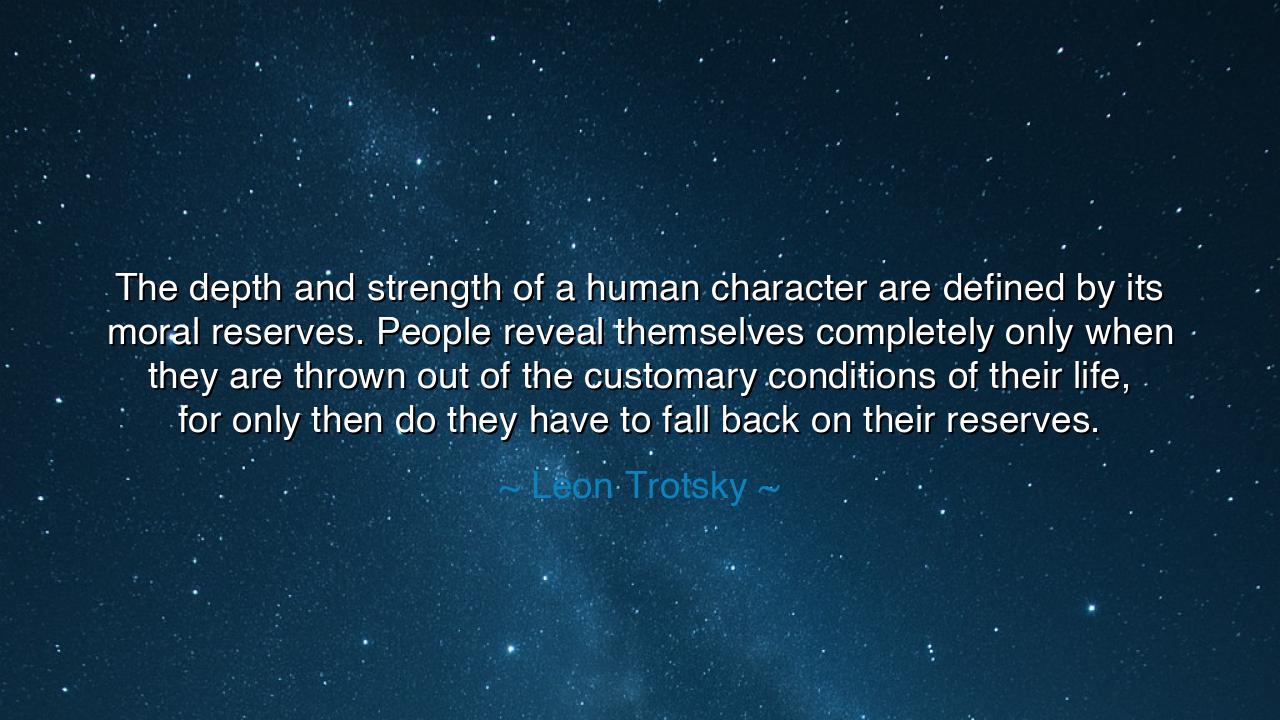
The depth and strength of a human character are defined by its
The depth and strength of a human character are defined by its moral reserves. People reveal themselves completely only when they are thrown out of the customary conditions of their life, for only then do they have to fall back on their reserves.






Hear the voice of the revolutionary, Leon Trotsky, who once declared: “The depth and strength of a human character are defined by its moral reserves. People reveal themselves completely only when they are thrown out of the customary conditions of their life, for only then do they have to fall back on their reserves.” These words echo across time, for they are forged in the fire of hardship and sharpened by the blade of truth. They remind us that the worth of a soul is not measured in days of comfort, but in the hours when all else is stripped away, and only the hidden wellspring of moral reserves remains.
The meaning is this: the true measure of a person lies not in how they conduct themselves when life is easy, but in how they endure when life is hard. In the smooth seasons, when food is abundant and friends are near, it is easy to seem kind, generous, and brave. But when storms arise, when hunger gnaws, when loneliness presses, when all the ordinary supports of life are removed—then, and only then, does one’s true character emerge. The shallow soul collapses; the deep soul draws upon inner reserves of strength, discipline, and virtue.
The ancients understood this well. Think of Socrates, imprisoned and awaiting death. In that moment, he had no comfort, no power, no worldly aid—only his moral reserves. He could have begged, lied, or compromised to save his life, but instead he drank the hemlock with calmness, proving that the well within him was deep and clear. His greatness did not shine most in the marketplace or the academy, but in the cell, when all else was taken from him.
History too bears witness in the life of Viktor Frankl, the psychiatrist who endured the horrors of the Nazi concentration camps. Stripped of possessions, of freedom, of family, he fell back upon the last of his reserves: the will to find meaning even in suffering. Others broke under the weight of despair, but Frankl endured, not because of circumstance, but because of the inner depth of his spirit. From those reserves, he not only survived but later taught the world that “he who has a why to live can bear almost any how.”
Trotsky’s words also serve as warning. Many who seem noble in times of plenty are revealed as hollow when crisis comes. The corrupt official, the cowardly soldier, the faithless friend—all shine brightly until tested, then collapse. In this we see the danger of a shallow life: if one has not cultivated inner strength, there is no reserve to draw upon when the world demands more than comfort allows. Without reserves, a man falls empty in the hour of need.
The lesson, then, is clear: cultivate moral reserves now, before the storm comes. Build your character in the quiet seasons, so that when the tempest rises, you will not be swept away. Practice honesty when it costs you little, so that you may remain honest when it costs you much. Train yourself in patience in the small irritations, so you may endure when great suffering arrives. Strengthen your compassion in ordinary days, so that in extraordinary days, you may stand as a shelter to others.
Practical actions must follow. Reflect daily on your choices, asking whether they make you stronger within. Embrace difficulties, even small ones, as training for the greater battles ahead. Do not avoid discomfort; welcome it as the sharpening of your soul. When you fail, do not despair, but learn, for each failure teaches you how to endure. And above all, anchor your life in principles greater than comfort—truth, justice, love—for these are the wells from which your reserves will flow.
For remember this eternal truth: the depth and strength of human character are revealed only in adversity. When all else falls away, when life presses you to the ground, it is the hidden reserves within that determine whether you will break or rise. As Trotsky taught, cultivate those reserves, and when the storm comes—and it will come—you will find within yourself the strength to endure, to stand, and to shine.






AAdministratorAdministrator
Welcome, honored guests. Please leave a comment, we will respond soon